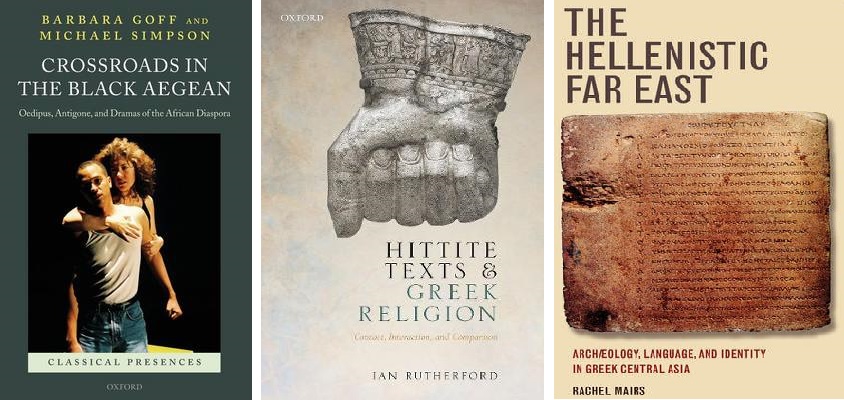Author: Prof. Barbara Goff. Edits: Bunny Waring.
Date: 26th March 2021.

Like much of the world, the University of Reading has recently been having important conversations about race. The death of George Floyd and the effects of the pandemic have enabled a togetherness that scrutinises racial inequalities in this society (and others) with renewed intensity. Many institutions are responding positively, including the University of Reading both as a whole and on Departmental levels. Soon, the University’s Race Equality Review will be published, and last week the Centre for Quality Support and Development ran a webinar on ‘Addressing Discrimination – Diversifying and Decolonising Higher Education’. The Department of Classics was there in force.
Ian Rutherford, Rachel Mairs and Barbara Goff presented on how their teaching addresses issue of diversity and decolonisation. While the term ‘diversity’ can point towards including the varied perspectives of groups who may have been excluded in earlier times, such as women, BAME people, people with disabilities, or with varied sexual orientation, ‘decolonisation’ invites us to focus more closely on questions of race and the long history of European colonial dominance and oppression over peoples of Africa, Asia and the Americas. Such questions include thinking about the history of our disciplines and how knowledge may have been affected by discriminatory attitudes; they also include thinking about how to make disciplines welcoming to students and scholars of varied backgrounds. Our Department includes Prof. Katherine Harloe, one of the few Black professors in the UK, but like many humanities departments, we do not include many BAME students. This is a situation which we would like to redress. It is important that the Department is a place where everyone feels they can flourish.

Classics as a discipline comes with a lot of racialised baggage. The cultures of Greece and Rome have historically been used sometimes to promote the idea of white western supremacy, and some groups nowadays who are still wedded to that idea use imagery of ancient Greece and Rome to serve their discriminatory agendas. In fact, the idea of ‘race’ is alien to the ancient world, which made many discriminations among people, but was not very interested in skin colour. Ian, Rachel and Barbara together showed how the ancient world offers paradigms for thinking about difference, and stressed that the modern discipline rejects simplistic claims about cultural superiority. Instead, classicists nowadays are intent on sharing the resources of the ancient world with all who might be interested.

Ian’s contribution reminded us that the Department of Classics has taught other cultures, as well as Greece and Rome, for many years. He teaches about ancient Anatolia, and about relations between Greece and Rome and ancient Egypt; in the past we have had modules on intersections with Jewish history and culture, and on ancient Carthage. The Ure Museum has an Egyptian collection alongside its Greek materials. Ian’s teaching and research shows how the ancient world was a place of endless movement and mingling of cultures, foreshadowing our own concerns with globalisation.

Rachel showed how her teaching addresses notions of decolonisation via her interest in how ancient Egypt has been perceived in western traditions. In her module on ‘Cleopatras’ she discusses Afrocentric scholarship, and how it contributes to reassessing assumptions about racial difference. The historical character of Cleopatra is claimed as both white and black, and the various arguments about her identity shed light on perceptions about history and race. Meanwhile her module on ‘Pioneers of Classical Archaeology’ examines how the discipline of archaeology has relied on the unacknowledged labour of people like the Egyptian labourers on digs, or the women who supported the ‘heroic’ male explorers.

Barbara drew attention to the Department’s work with groups who promote classics in state schools, such as’ Classics for All’ (https://classicsforall.org.uk/) and ‘Advocating Classics Education’ (http://aceclassics.org.uk/ ). She also talked about how teaching in the core modules on Ancient Drama and Ancient Epic includes discussion of African rewritings of classical literature, such as Derek Walcott’s Omeros or Wole Soyinka’s The Bacchae. Authors of African descent have frequently engaged with classical literature, in Africa, the United States, the Caribbean, and Europe, so that some such rewritings have become part of the classical ‘canon’ themselves. Classical drama is not only performed throughout the world, but also reused and adapted by different societies to their own ends; this reuse is one of the major ways in which the discipline of classics stays vibrant and relevant in the modern world.
Together, the contributions made it clear that ‘decolonising’ is not about rewriting history, or about removing Homer from syllabi. It is instead about teaching and research that is rooted in the diversity of the ancient world and of modern responses to it. The Department’s work on this topic continues next term with a seminar series on inclusivity. Next term too, Katherine Harloe and Rachel Mairs will run a roundtable where students will be invited to talk about issues facing BAME students, students with disabilities, and students who identify as LGBTQI+, in the Department and the University. We look forward to some fruitful, if challenging, conversations.









